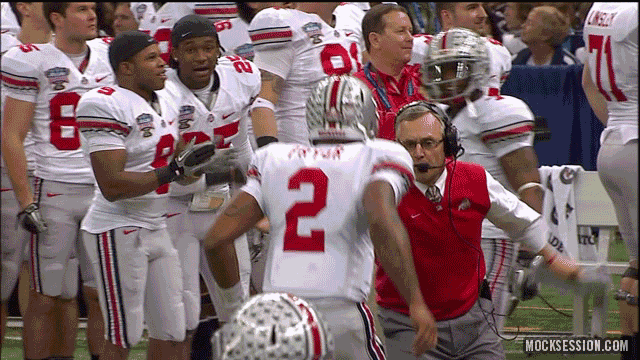 While the BCS and the NCAA are engaged in a full sprint towards a playoff that should have been in place a decade ago, the NCAA?s student-athletes are again being ignored. Instead of subtracting a game from the regular season, the NCAA is set on maximizing its profits by incorporating a playoff into its regular season. ?That?s fine. It’s the capitalist way.
While the BCS and the NCAA are engaged in a full sprint towards a playoff that should have been in place a decade ago, the NCAA?s student-athletes are again being ignored. Instead of subtracting a game from the regular season, the NCAA is set on maximizing its profits by incorporating a playoff into its regular season. ?That?s fine. It’s the capitalist way.
However, the NCAA’s hypocrites can?t embrace laissez-faire capitalism in its practices and socialist towards its payment of athletes without losing what’s left of its credibility. I?m not going to suggest that athletic programs begin paying student-athletes. They already receive full athletic scholarships, which are used to pay scholarships and expenses for non-revenue sports. Those non-revenue sports offer thousands of teenagers an opportunity to attend college. By paying guys like Matt Barkley and the Trojans? third string backup the same amount of cash, the NCAA would be eliminating numerous athletic programs. In 2010, only 22 of 120 athletic departments made a profit. By paying athletes more than the $2000 increase recently approved by the NCAA, mid-majors and even a few major conference programs will be forced to cut numerous teams for budgetary reasons.
The only logical response is by redefining the NCAA?s definition of amateurism for the 21st century. Ironically, the first person to see the light was the NCAA?s first leader. After retiring, Walter Byers, the NCAA?s first Executive Director railed against the system that he once oversaw and told Time Magazine, “The coaches own the athletes’ feet, the colleges own the athletes’ bodies, and the supervisors retain the large rewards. That is not appropriate at this time of high dollars.?
Merriam-Webster?s English Dictionary has three definitions of the word amateur. None of them address working for free. The NCAA doesn?t need to redefine amateurism, it just has to catch up to the times a little quicker.
Under current NCAA rules, it is a major violation for student-athletes to receive endorsements or extra benefits from companies or boosters based on their athletic abilities. According to NCAA Bylaw 16, the NCAA defines an extra benefit as any special arrangement by an institution employee or a representative of the institution?s athletic interest (?Booster?) to provide a student-athlete (or a student-athlete?s relative or friend) a benefit that is not generally available to other Niagara University students and their relatives and/or friends, or, is not expressly authorized by the NCAA legislation. That includes communicating with sports agents.
Basically, athletes can?t receive any perks related to their athletic ability. That discombobulated logic is the equivalent of stipulating that music majors are barred from performing in concerts outside school grounds or from talking to any predatory music executives who?d like to do something as silly as make money for them or pay for your flight.
Essentially, NCAA athletes are barred from even getting any type of discount deal the average person looks for or it could be conceived an illegal benefit. The NCAA even places a cap of $2000 for yearly wages that student-athletes can earn for employment during the calendar year.
Sometimes, though they even govern wages and rewards earned away from.
In 1997, the NCAA objected to Northwestern’s running back Darnell Autry, a fourth place Heisman Trophy candidate, acting in a motion picture despite the fact that he was a theatre major.
In 2004, Jeremy Bloom, a junior receiver at Colorado was forced to choose between keeping his collegiate eligibility and receiving endorsement money he needed to train for the 2006 Winter Olympics. Bloom chose the Winter Olympics and was forced to relinquish his collegiate scholarship and his college football career.
 Last December, Ohio State quarterback Terrelle Pryor and four teammates were suspended by the NCAA for trading their own game memorabilia including Big Ten championship rings and jerseys for tattoos. In the world outside, the NCAA?s realm it would be a legal transaction. 2010 Heisman winner, Cam Newton is still under investigation by the NCAA for allegedly receiving $180,000 to attend Auburn, which was then used to repair his father?s dilapidated church.
Last December, Ohio State quarterback Terrelle Pryor and four teammates were suspended by the NCAA for trading their own game memorabilia including Big Ten championship rings and jerseys for tattoos. In the world outside, the NCAA?s realm it would be a legal transaction. 2010 Heisman winner, Cam Newton is still under investigation by the NCAA for allegedly receiving $180,000 to attend Auburn, which was then used to repair his father?s dilapidated church.
As outrageous as it may seem, the model for this hypothetical paradigm shift in the NCAA?s amateurism rules has already been done before.
The NCAA?s model for change should be none other than the Olympic Games. For much of its history, the Olympic Games were a purist competition strictly for amateur athletes. In 1912, legendary athlete Jim Thorpe was stripped of two gold medals in an old-fashioned ?scandal? that involved Thorpe previously taking $25,000 to play minor league baseball.? It wasn?t until 1988 that the Olympic Committee rid itself of the last of its amateurism rules that barred professionals from competing.
Legalizing the extra benefits of boosters and opening the floodgates of endorsements won?t change the purity of college athletics. That’s what they said about the Olympics, which is still thriving today. Student-athletes will still have to earn a minimum grade point average to remain eligible and won?t receive checks from universities. Most importantly, it will still be entertaining. Every student-athlete won?t earn the same off the field but that?s preparation for the real world.
The original intention of the NCAA?s policy on ?impermissible benefits? is to prevent larger schools from gaining a competitive advantage in recruiting. However, there is already an institutionalized competitive imbalance in college athletics between BCS conference and mid-majors. Schools that have the best facilities and exposure already secure the top athletes. Look at Oregon, which basically has its own Willy Wonka of athletics in Nike founder Phil Knight. While outfitting hundreds of athletic programs around the country Oregon has essentially become Phil Knight?s Auxillary Nike Chocolate Factory.
College football has only increased the divide with the creation of the Bowl Championship Series, which invites major conference champions to play in the most lucrative bowl games. There may never be complete parity in college athletics between athletic programs but the NCAA can at least attempt to bridge the gap between its own exorbitant profits and the prices these athletes pay by putting their bodies on the line for the NCAA?s profit. Universities shouldn?t pay the bill but nothing should prevent worthy student athletes from making a profit of their own.



